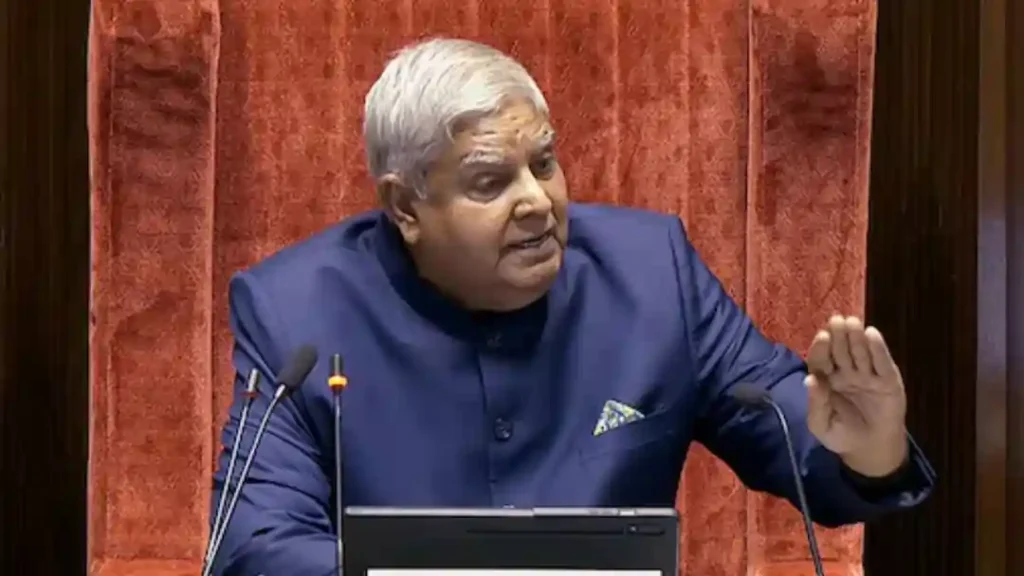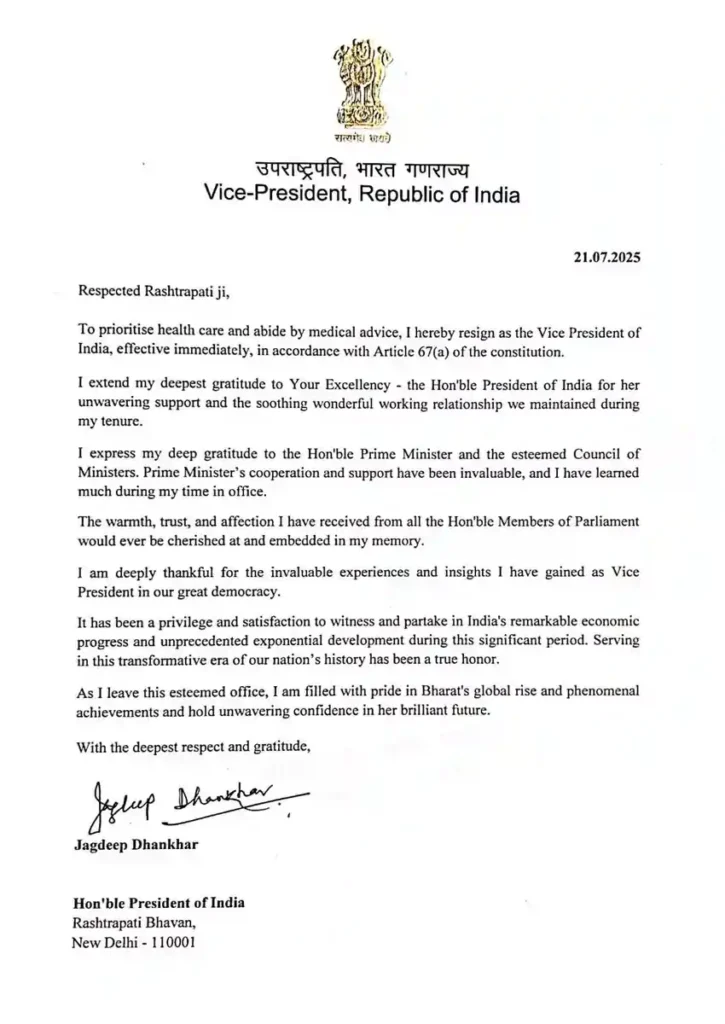New Delhi: On July 21, 2025, India witnessed a significant political development as Vice President Jagdeep Dhankhar tendered his resignation, citing health concerns. This unexpected move, announced on the first day of the Monsoon Session of Parliament, marks him as only the third Vice President in India’s history to resign before completing the five-year term.

Background: Jagdeep Dhankhar’s Tenure as Vice President
Jagdeep Dhankhar, aged 74, was elected as India’s 14th Vice President in August 2022, with his term originally set to conclude in 2027. As per Article 64 of the Constitution of India, the Vice President serves as the ex-officio Chairman of the Rajya Sabha, the upper house of Parliament. Dhankhar, a seasoned politician and former Governor of West Bengal, brought a unique perspective to the role, often emphasizing issues like farmers’ rights and the need for open dialogue. His tenure was marked by active participation in public discourse and a hands-on approach to presiding over Rajya Sabha proceedings.
Dhankhar’s resignation came as a shock to many, especially since he had presided over the Rajya Sabha session on the morning of July 21, 2025, and had engaged with MPs and floor leaders until the evening. Despite a cardiac event in March 2025, he had reportedly recovered and continued his duties, making his sudden exit even more surprising.
The Resignation: Citing Health Reasons
In a letter addressed to President Droupadi Murmu, posted on his official X account, Dhankhar announced his resignation, effective immediately, under Article 67(a) of the Constitution. The letter stated, “To prioritise health care and abide by medical advice, I hereby resign as the Vice President of India, effective immediately, in accordance with Article 67(a) of the Constitution.” He expressed gratitude to President Murmu for her unwavering support, Prime Minister Narendra Modi, the Council of Ministers, and MPs for their “warmth, trust, and affection.”
The Ministry of Home Affairs formalized the resignation by adding it to the Gazette on July 22, 2025. Dhankhar’s letter highlighted his health concerns, referencing a cardiac event earlier in the year. However, sources indicate that he gave no prior indication of his decision, even during interactions with MPs as late as 7:30 p.m. on July 21. A Congress leader noted that Dhankhar had been scheduled to visit Jaipur on July 22 to interact with members of the Confederation of Real Estate Developers’ Association of India (CREDAI), further underscoring the abrupt nature of his decision.

Constitutional Provisions: Article 67(a) and Beyond
Article 67(a) of the Constitution of India provides a clear mechanism for the Vice President’s resignation: “The Vice-President may, by writing under his hand addressed to the President, resign his office.” This provision allows for a straightforward process without the need for parliamentary approval. Once the President receives the resignation, it takes effect immediately, and the process is deemed complete. Dhankhar’s invocation of Article 67(a) aligns with this constitutional framework, making his resignation legally unassailable.
Article 67 outlines the Vice President’s term, stating that they hold office for five years but can vacate earlier due to resignation, removal, or death. In the event of a vacancy, the Constitution mandates that an election to fill the position be held as soon as possible, as per the Presidential and Vice-Presidential Elections Act, 1952. The newly elected Vice President serves a full five-year term from the date of assuming office, as stipulated in Article 67.
Other relevant constitutional provisions include:
- Article 63: Establishes the office of the Vice President of India.
- Article 64: Designates the Vice President as the ex-officio Chairman of the Rajya Sabha.
- Article 65: Allows the Vice President to act as President or discharge presidential functions during vacancies or absences.
- Article 66: Outlines the election process, where the Vice President is elected by an electoral college comprising members of both Houses of Parliament using proportional representation. Qualifications include being a citizen of India, at least 35 years old, and eligible for election to the Rajya Sabha.
Following Dhankhar’s resignation, the Rajya Sabha will be temporarily presided over by the Deputy Chairman, Harivansh Narayan Singh, until a new Vice President is elected.
Political Reactions and Speculations
The resignation sparked varied reactions across the political spectrum. Senior Congress leader Jairam Ramesh, the party’s chief whip in the Rajya Sabha, called the decision “inexplicable” and “shocking.” In a post on X, Ramesh noted that he had spoken to Dhankhar at 7:30 p.m. on July 21 and received no hint of the impending resignation. He suggested that there might be “far deeper reasons” behind the move, pointing to Dhankhar’s scheduled announcements related to judicial impeachment motions on July 22.
Ramesh also praised Dhankhar’s impartiality in holding both the government and opposition accountable, urging Prime Minister Modi to persuade Dhankhar to reconsider for the “nation’s interest” and the “farming community.” Dhankhar’s advocacy for farmers, particularly during fresh protests in December 2024, had resonated widely, as he called for open dialogue at an event alongside Union Agriculture Minister Shivraj Singh Chouhan.
The Opposition’s skepticism was fueled by the timing of the resignation, which coincided with significant judicial controversies involving impeachment motions against two judges.
Judicial Controversies: Impeachment Motions Against Justices Varma and Yadav
Dhankhar’s resignation occurred amidst two high-profile impeachment motions against judges, adding a layer of complexity to the political narrative. On July 21, 145 Lok Sabha members and over 50 Rajya Sabha members submitted motions under Articles 124, 217, and 218 of the Constitution to remove Justice Yashwant Varma of the Allahabad High Court. Additionally, a motion moved by 54 Opposition MPs in December 2024 targeted Justice Shekhar Yadav for allegedly making a hate speech. The Rajya Sabha Secretariat had verified at least 50 signatories for the latter motion, meeting the minimum requirement under the Judges (Inquiry) Act, 1968.
The constitutional provisions governing judicial removals are:
- Article 124(4): Allows for the removal of Supreme Court judges on grounds of proven misbehavior or incapacity.
- Article 124(5): Empowers Parliament to regulate the procedure for presenting an address and investigating a judge’s misbehavior or incapacity, as implemented by the Judges (Inquiry) Act, 1968.
- Article 217(1)(b): Extends the removal process for High Court judges, following the same procedure as Article 124(4).
- Article 218: Applies Articles 124(4) and 124(5) to High Court judges.
Dhankhar had been expected to address these motions in the Rajya Sabha on July 22, as he told an Opposition MP at 4:00 p.m. on July 21. His sudden resignation has left these matters pending, with the Rajya Sabha Secretariat continuing to verify signatories for the motion against Justice Yadav. There is no fixed timeframe for deciding on such notices, adding uncertainty to the process.
Dhankhar’s Tenure: A Legacy of Engagement and Controversy
Dhankhar’s tenure as Vice President was marked by both achievements and controversies. His rural, farming background informed his vocal advocacy for farmers’ issues, notably during the December 2024 protests. His public speeches often emphasized the need for dialogue and inclusivity, earning him respect from various quarters. However, his relationship with the Opposition was occasionally strained, as evidenced by a December 2024 impeachment motion against him, dismissed by Deputy Chairperson Harivansh Narayan Singh as an attempt to “denigrate the dignity of a constitutional authority.”
Dhankhar’s active role in the Rajya Sabha, including his intervention in the Opposition-sponsored motion against Justice Varma on July 21, showcased his commitment to parliamentary duties. His participation in the Business Advisory Committee meeting at 12:30 p.m. on the same day further highlighted his engagement until the final hours of his tenure.
What Happens Next?
With Dhankhar’s resignation, the Election Commission of India will initiate the process to elect a new Vice President under the Presidential and Vice-Presidential Elections Act, 1952. The Deputy Chairman will oversee Rajya Sabha proceedings in the interim. President Murmu has not yet indicated whether she has formally accepted the resignation, but the Gazette notification suggests it is a done deal.
The resignation’s timing, amidst judicial impeachment motions and the Monsoon Session, raises questions about underlying political dynamics. The lack of prior indication, as noted by MPs and Congress leader Jairam Ramesh, fuels speculation about additional factors beyond health concerns. Dhankhar’s exit leaves a void in the Rajya Sabha’s leadership and the broader political landscape, particularly given his advocacy for farmers and his balanced approach to governance.
Conclusion
Jagdeep Dhankhar’s resignation as Vice President of India on July 21, 2025, is a historic moment, marking only the third time a Vice President has stepped down before completing their term. Citing health reasons under Article 67(a), Dhankhar’s exit has sparked debates about its timing and potential deeper motivations, especially given the pending judicial impeachment motions. His tenure, characterized by active engagement and advocacy for farmers, leaves a complex legacy. As India prepares for a new Vice President, the political and judicial ramifications of this resignation will continue to unfold, shaping the nation’s discourse in the months ahead.
Frequently Asked Questions
1. Why did Vice President Jagdeep Dhankhar resign?
Vice President Jagdeep Dhankhar resigned on July 21, 2025, citing health reasons. In his resignation letter to President Droupadi Murmu, he stated that he was stepping down to prioritize healthcare and abide by medical advice, following a cardiac event in March 2025. The resignation was submitted under Article 67(a) of the Constitution of India and took effect immediately.
2. What is Article 67(a) of the Indian Constitution?
Article 67(a) of the Constitution of India allows the Vice President to resign by submitting a written letter addressed to the President. The resignation does not require parliamentary approval and is effective immediately upon receipt by the President, making it a straightforward process as outlined in the Constitution.
3. What happens after the Vice President’s resignation?
Following the resignation, the office of the Vice President becomes vacant, and the Rajya Sabha is temporarily presided over by the Deputy Chairman, Harivansh Narayan Singh. The Election Commission of India initiates the election process to fill the vacancy under the Presidential and Vice-Presidential Elections Act, 1952. The newly elected Vice President will serve a full five-year term from the date of assuming office.
4. Why was Jagdeep Dhankhar’s resignation considered surprising?
Dhankhar’s resignation was unexpected because he gave no prior indication of his decision, even during interactions with MPs until 7:30 p.m. on July 21, 2025. He had presided over the Rajya Sabha’s Monsoon Session that morning and was scheduled for engagements, including a visit to Jaipur on July 22. The timing, amidst judicial impeachment motions, fueled speculation about deeper reasons, as noted by Congress leader Jairam Ramesh.
5. What judicial controversies were linked to Dhankhar’s resignation?
Dhankhar’s resignation coincided with two impeachment motions against judges. One motion, signed by 145 Lok Sabha and over 50 Rajya Sabha members, targeted Justice Yashwant Varma of the Allahabad High Court. Another, moved by 54 Opposition MPs in December 2024, sought to remove Justice Shekhar Yadav for alleged hate speech. Dhankhar was expected to address these motions on July 22, adding intrigue to the timing of his exit.

